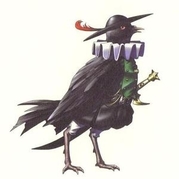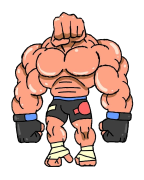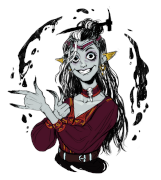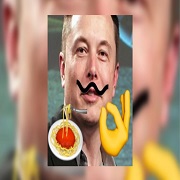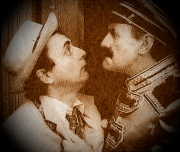|
DarklyDreaming posted:And the new Suicide Squad which is basically "The US did some hosed up poo poo in South America" for 132 minutes Including Cena's character who's the most flag humping "literally any atrocity is justified by saying it's for freedom" fascist imaginable.
|
|
|
|

|
| # ? Apr 27, 2024 16:58 |
|
Sanguinia posted:
This is where the metaphor breaks down though. Black people, gay people, etc. don't actually have some kind superhuman powers that could potentially threaten you. But in the fictional worlds that do this kind of thing, they often give the minority group stand-in abilities that do in fact make them objectively more dangerous or at least different. Accepting the metaphor requires you to make some pretty weird moral leaps. Sure, it's usually helped by the narrative dice being loaded by the anti-mutants being written as obviously odious/evil/etc. But the overall metaphor still doesn't hold that much water when you think about it. "I don't want to enter into a business deal with a black guy, because he's black." = baseless bigotry. "I don't want to enter into a business deal with the guy who can read minds because I'll always be at a disadvantage in negotiations, because he may read my mind" = a substantially more grounded and reasonable concern, even if the dude with the mind reading ability is a stand up guy who would never do that. Like, I know these are comic books, etc. but imo the mark of good fiction with crazy things like superpowers is people still reacting relatively believably to extraordinary circumstances, and for the allegory to be morally coherent it kind of has to fail this test in a lot of ways. Killer robot posted:
Yeah, this is exactly the issue. The metaphor works on a surface level because of the narrative dice loading, but it gets really awkward once you think about it on any level past that. Like, they do the narrative slanting and make the senator character referenced in the other post I quoted loathsome so the audience know who to root for, but in a world where there was a non-trivial risk of everyone born with a certain gene becoming walking WMDs, believing that it was a good idea to keep some kind of list of people with said gene would probably be a pretty mainstream belief. Might by seen as the more progressive option relative to other options. I think this kind of setting can make for great stories about fear, balancing public safety with individual rights, etc. But it doesn't really work for a clean cut parable about bigotry when you think about it. Fill Baptismal fucked around with this message at 04:36 on Nov 4, 2021 |
|
|
|
Raenir Salazar posted:I find the DC movies can sometimes be surprising subversive. Like in Red Son you have Soviet Supes killing Stalin to end the gulags; this presents interesting questions and implications about the main timeline Supes and the US prison system. At the risk of inviting ire for invoking the name of Moviebob, his video essay series on Batman v Superman's failures is particularly harsh on the movie for acting like it was going to go in this direction and cowarding out incredibly hard. In the time since Man of Steel, Superman has become a borderline messianic figure for the poor and downtrodden in many nations, saving them from natural disasters and the like without asking anything in return. Then he intervenes in an African conflict zone to rescue Lois and just leaves without thought for the fallout of his actions. A woman testifies before the US Congress about the atrocities done by the militants in reprisal for his actions. "I ask, how does he decide who to save? He answers to no one, not even I think to God." At the same time, Clark Kent has taken on a personal crusade against Batman, as his return has involved horrific violations of civil rights and intentional efforts to get the criminals he captures killed in prison. When Bruce Wayne confronts him at a fancy gala he's covering for the Planet over his anti-Batman article, Clark is pretty self-righteous about Batman being dangerous and harmful to people he purports to protect. Bruce scarcely conceals his contempt for what he perceives as idiotic naivety from a kid at least 10 years his junior if not more. The movie could have been about both parts of this divide, Bob argues. Confronting Superman as an allegorical reflection of American Interventionist policy and the myth of its objective goodness, and having the ideological conflict between Batman and Superman informed by their generational divide and how that influences their world view. Don't just give this Populist Millennial Superman a problem with Batman, give him a problem with all police power abuse. Have him stand between an unarmed black man and a cop's bullet, or a refugee caravan and ICE agents. Don't just chide him for leaving countries to fend for themselves in his wake, have him learn something from it, and expect the same from the US military to the point he starts getting in their way. Have him stop a Predator Drone from taking out an ISIS commander because of the collateral damage even as he brings the guy in himself (Injustice used this one!). Use this to fuel both his conflict with the US Government ("Must there be a Superman?" "There is.") AND his conflict with an Authoritarian Gen-X Batman who's always been on the Gotham PD's side and see's a being liken unto a God dictating right and wrong to a world that can't do anything about it. Instead it fled from the very issues it invoked because it didn't want them as any more than window dressing.
|
|
|
|
Fill Baptismal posted:This is where the metaphor breaks down though. Black people, gay people, etc. don't actually have some kind superhuman powers that could potentially threaten you. But in the fictional worlds that do this kind of thing, they often give the minority group stand-in abilities that do in fact make them objectively more dangerous or at least different. Accepting the metaphor requires you to make some pretty weird moral leaps. Sure, it's usually helped by the narrative dice being loaded by the anti-mutants being written as obviously odious/evil/etc. But the overall metaphor still doesn't hold that much water when you think about it. Yeah, but the issue in X-Men isn't the guy who doesn't want to do a business deal with a mind-reading mutant, its the guy who doesn't want to do a business deal with ANY mutant because hey, he might be able to read my mind, that's a thing mutants can do. That's the reason I specifically used the example of the "He might have a gun!" racist trope. The stereotypical person saying they wouldn't want to be near the black man in a dark alley because he might be armed and dangerous is implying that if the person had been white, they wouldn't have needed the worry. Like, people have often said over the years that X-Men is hurt by it not making sense for people to be bigoted against mutants in a Superhero World like Marvel, but it's actually a strength. Business Man should be on guard for LITERALLY ANYONE to be able to read his mind because literally anyone might have that power. But its only a concern for him when he finds out his potential partner is a mutant. As I said, THAT'S the racism metaphor. People equate mutant with dangerous when, in the context of the world they live in, it's not reasonable even if you can technically rationalize it. "Black people statistically commit more violent crime in my city than white people, ergo its rational for me to be on guard more around them and that surely won't lead to any systemic racist outcomes in society." "Mutants have a statistical chance to have a power that is dangerous to me rather than one that isn't, ergo its rational to make them register with the government and that surely won't lead to them being put into camps." Admittedly it gets a little weirder in the X-men solo movies, but I still don't think the metaphor breaks down entirely.
|
|
|
|
the bigger issue is that the earth in comic books is constantly reeling from downright cataclysmic disasters, and for a regular person in that setting it would be reasonable, frankly, for them to desperately grasp at anyone promising to do something about the evil gods killing thousands every quarter. like jeez, marvel earth is kind of hell. why yes i have just finished reading Immortal Hulk, why do you ask
|
|
|
|
Sanguinia posted:Yeah, but the issue in X-Men isn't the guy who doesn't want to do a business deal with a mind-reading mutant, its the guy who doesn't want to do a business deal with ANY mutant because hey, he might be able to read my mind, that's a thing mutants can do. That's the reason I specifically used the example of the "He might have a gun!" racist trope. The stereotypical person saying they wouldn't want to be near the black man in a dark alley because he might be armed and dangerous is implying that if the person had been white, they wouldn't have needed the worry. That's another one of those things that works well for a surface reading but routinely shoots itself in the foot for actual practice. Occasionally there's a thing where Spider-Man gets taken for a mutant by some bigot or a mutant avoids bigotry by pretending to be an alien, but usually everyone from organized mutant hunters to random folks end up incredibly accurate about who to hate and who to give a pass. Visible super types with total cipher backgrounds don't end up interacting with mutant menace hysteria by and large, while mutants don't even need to show anything obvious to be hounded for it. Sometimes it gets to the point that it only really makes sense if anti-mutant people all have the mutant power to detect other mutants by smell or something. A lot of it's individual cases of sloppy writing, but a lot of it is structural too, and untangling that would mean a lot more setting attention in both mutant and non-mutant Marvel titles. A big flaming stink posted:the bigger issue is that the earth in comic books is constantly reeling from downright cataclysmic disasters, and for a regular person in that setting it would be reasonable, frankly, for them to desperately grasp at anyone promising to do something about the evil gods killing thousands every quarter. I forget where I saw it, but I once saw a timeline of specifically mutant-related events of the Marvel universe. It was based on the conceit X-comics had for a long while where one year would pass in setting for every three publication years. It would always be roughly "today" but supposedly everyone was supposed to get a year older every three years. So the timeline was like "If that was true for the entire publication history of X-Men, and the latest issues are today, when did these events happen? As it turns out, that also makes those cataclysmic three times as close together, and the world becomes an absolutely horrifying place for even random bystanders, much less someone connected enough to supers life to know what the mutants are up to these days when it's not international news. Killer robot fucked around with this message at 07:03 on Nov 4, 2021 |
|
|
|
It's fine for allegories to have limits. If you read some fable about a fox trying to trick a rabbit and then learning a lesson about fairness or something. You are supposed to understand the lesson about fairness, not dig into some weird rabbithole of trying to figure the moral dimensions of a prey animal and a predator being friends. Like yeah tons of x-men doesn't make sense in a tactical realism way, but that is how allegory works, no one is reading it and going "I'm so confused! I don't get this!", they understand that some parts are a standin for real things and some parts are just part of the fictional narrative.
|
|
|
|
Killer robot posted:As it turns out, that also makes those cataclysmic three times as close together, and the world becomes an absolutely horrifying place for even random bystanders, much less someone connected enough to supers life to know what the mutants are up to these days when it's not international news.
|
|
|
Jaxyon posted:Including Cena's character who's the most flag humping "literally any atrocity is justified by saying it's for freedom" fascist imaginable. Cena's character is a guy who think it's a good idea to turn a country into a desert and call it peace. Interestingly Rick Flag is also pretty flag humping and because of that he's completely blind to the fact that Waller is evil. I liked the movie a lot, partly because very few american action movies has the message of "America is willing to let a country burn if it suits their interests."
|
|
|
|
|
Sanguinia posted:At the risk of inviting ire for invoking the name of Moviebob, his video essay series on Batman v Superman's failures is particularly harsh on the movie for acting like it was going to go in this direction and cowarding out incredibly hard. In the time since Man of Steel, Superman has become a borderline messianic figure for the poor and downtrodden in many nations, saving them from natural disasters and the like without asking anything in return. Then he intervenes in an African conflict zone to rescue Lois and just leaves without thought for the fallout of his actions. A woman testifies before the US Congress about the atrocities done by the militants in reprisal for his actions. "I ask, how does he decide who to save? He answers to no one, not even I think to God." No worries, its a pretty good essay and as I'm sure you know I'm the last person to bother you about it.  I think that analysis hits it on the head where the movie seems to have no idea what kind of Superman he is; so instead of setting up an interesting ideological conflict that Batman and Superman need to resolve by punching each other it instead feels more like a contrived mess. When I look at the animated movies and say "When they take a swing and they swing hard" its more that, "Oh this scene is spicy", although I find Red Son asks a lot of questions but very indirectly and that makes it interesting to me. Like you have Lex Luthor who single handedly saves America from collapse by acting as Liberal democratic capitalism's cheat code in response to Superman being Communism's cheatcode and I end up feeling that the movie as a result basically says nothing about the respective systems and instead I suppose maybe says that regardless of system it shouldn't be up to gods walking among men forcing it to work. Which is also interesting because its almost kinda taking a swing at its own universe/franchise.
|
|
|
|
Raenir Salazar posted:I suppose maybe says that regardless of system it shouldn't be up to gods walking among men forcing it to work. Which is also interesting because its almost kinda taking a swing at its own universe/franchise.
|
|
|
|
roomforthetuna posted:Reality is basically a really long boring show about how doing these things well without a god-monster to push it through doesn't work at all. The closest we get to the Dr Doom we need is basically Elon Musk. Which segues nicely into Pratchett. While most of his social critique is not exactly subtle, everything related to Havelock Vetinari points towards even a comically unrealistic super-genius with effectively boundless power and influence being barely able to vaguely steer society.
|
|
|
|
the X-Men as parable (especially for minority rights and struggles) only works well if the X-Men are doing their thing, alone, in their own universe where the sole focus is the emergence of mutancy and the resulting reactionary societal backlash and crackdowns that result from it. Tying it into the same comic book universe where superheroes and aliens and psychic wizards and poo poo have been having their superpower duels for as long as everyone's been alive just invalidates the narrative setting. Like, mutants would appear and people would just be like "this is supposed to be news? our city gets protected from giant rhino-men and vampires and extraterrestrial symbiotes that wear themselves on their hosts by some dude who has psycho spider powers lmao" and you're not going to have a gainly scenario play out where the authorities are all like "false alarm fellas, this hulk guy, not a mutant, actually just some gamma ray mutation he had this one time, completely different thing, withdraw the Sentinels, he's perfectly ok to continue" like if he was superpowered because of a natural gene expression instead, whambo bambo suddenly its very different. As it is they have to stridently pretend like the mutants are having their civil disorder and conflict events happening in a weird bubble that just gets spontaneously ignored by the rest of superhero-kind so it is 100% only mutant on mutant poo poo, like in the mavel reboot where within one chapter magneto is literally occupying washington dc and publicly executing the president on live TV and well I guess literally every other superhero group was just out that day, what are the odds? magneto's livestreaming execucide and all our calls to the avengers just goin to vm lol drat
|
|
|
|
Aramis posted:Which segues nicely into Pratchett. While most of his social critique is not exactly subtle, everything related to Havelock Vetinari points towards even a comically unrealistic super-genius with effectively boundless power and influence being barely able to vaguely steer society. Finally, the classics! Though I'm always split between him and Douglas Adams. I prefer Adams voice but I find Pratchett more poignant.
|
|
|
|
Gumball Gumption posted:Finally, the classics! That's because you haven't yet accepted the fact that Wonko's outlook is the most apt one.
|
|
|
|
Kavros posted:the X-Men as parable (especially for minority rights and struggles) only works well if the X-Men are doing their thing, alone, in their own universe where the sole focus is the emergence of mutancy and the resulting reactionary societal backlash and crackdowns that result from it. Tying it into the same comic book universe where superheroes and aliens and psychic wizards and poo poo have been having their superpower duels for as long as everyone's been alive just invalidates the narrative setting. Like, mutants would appear and people would just be like "this is supposed to be news? our city gets protected from giant rhino-men and vampires and extraterrestrial symbiotes that wear themselves on their hosts by some dude who has psycho spider powers lmao" and you're not going to have a gainly scenario play out where the authorities are all like "false alarm fellas, this hulk guy, not a mutant, actually just some gamma ray mutation he had this one time, completely different thing, withdraw the Sentinels, he's perfectly ok to continue" like if he was superpowered because of a natural gene expression instead, whambo bambo suddenly its very different. I feel like you need to look up how stupid real world bigotry is, the list of who is or isnít socially okay is a hilariously complex and thin lined web. Like which near identical religions are or are not socially acceptable to various groups would be nearly unexplainable to someone out of the society.
|
|
|
|
Owlofcreamcheese posted:I feel like you need to look up how stupid real world bigotry is, the list of who is or isnít socially okay is a hilariously complex and thin lined web. Like which near identical religions are or are not socially acceptable to various groups would be nearly unexplainable to someone out of the society. "Mutants didn't earn their power like I did and that's bad for society" Headline to op-ed for the Daily Bugle, written by Tony Stark
|
|
|
|
The best real world racism is Japanese burakumin where it is based on your ancestors jobs so the only way you can know who to be racist against is look in books they kept at town hall and people to this day are caught illegally looking up peoples status or French cagots where literally no one on earth has any idea what a cagot even is and have no identifying features but people were brutally racist against for centuries without being able to articulate why some towns were cagot towns. The idea that one type of hero would be lauded and one hated on arbitrary lines is no sillier than the different treatment vin desiel and Obama get (both half black)
|
|
|
|
fool of sound posted:I'm not super into either comic books or the MCU so I might be missing some context but I think the basic structure of Civil War is pretty interesting, the movie makes a bunch of noise about Cap's dedication to freedom and non-intrusion and whatever, but I think the more interesting reading is that the former weapons contractor of course has no issue throwing the power of Avengers behind a national interest, while the former soldier does. Despite his origin story, Stark is and has always been insulated from the effects of the American foreign policy apparatus and war machine, while Captain America deliberately bore the brunt of it out of nationalistic pride and is cost him everything, and that directly informs their worldviews. I dunno much about the MCU, but in the comics, Stark seemed to have a hint of an anti-revolutionary sentiment. His stance as I remember it was basically that anti-superpower hawks would inevitably get their way in the end and conduct a brutal crackdown or outright purge against superpowered folks, so rather than wait for the US to outright go to war against them, he would rather turn collaborationist and hope to head off the most hateful and prejudiced aspects by taking control of the anti-superpowers squads himself. While there was also a strand of "I know better than you because I'm a supergenius" authoritarianism to Stark and Reed's support of the government, I felt like there was something deeper: he was convinced that the US government would go to all-out war against people with powers, and while he was afraid that the government would win and purge the powered folks, he was even more afraid of the possibility that the powered folks might win that war. He hoped that by allying with the government, he could avert both possibilities by using the resources of the state combined with ruthless authoritarianism to impose a compromise peace deal of his own design. He would do his utmost to eliminate any chance that the superpowered folks might be able to win against state oppression, and in return he would use the influence that garnered him to convince the government to allow the superpowered folks to live under the state's iron yoke. I'm not sure how much of that was intentionally written in as something Stark actively considered vs how much is a natural outcome of the limits set on Marvel fiction as a whole, though. The commitment to the status quo and generally anti-revolutionary tone of the writing means that superhumans overthrowing the government is only possible in alt-history tales like Squadron Supreme. And an anti-superhuman war run by the most prejudiced and bigoted elements of Marvel America would be too bloody and brutal to reasonably set up the "heroes fighting each other in a morally gray clash" setting comic writers love so much. Sanguinia posted:Yeah, but the issue in X-Men isn't the guy who doesn't want to do a business deal with a mind-reading mutant, its the guy who doesn't want to do a business deal with ANY mutant because hey, he might be able to read my mind, that's a thing mutants can do. That's the reason I specifically used the example of the "He might have a gun!" racist trope. The stereotypical person saying they wouldn't want to be near the black man in a dark alley because he might be armed and dangerous is implying that if the person had been white, they wouldn't have needed the worry. The problem is that even though the Marvel universe is supposed to have plenty of these mutants who don't really have any meaningful powers at all, X-Men as a whole is about people who do have these world-shaking powers getting into fights over the fate of the world. The stories are never about the people who don't really have powers. They're background characters to give a selfless heroic cause to the adventures of a squad of people who could fight tanks and win.
|
|
|
|
Main Paineframe posted:The problem is that even though the Marvel universe is supposed to have plenty of these mutants who don't really have any meaningful powers at all, X-Men as a whole is about people who do have these world-shaking powers getting into fights over the fate of the world. The stories are never about the people who don't really have powers. They're background characters to give a selfless heroic cause to the adventures of a squad of people who could fight tanks and win. I feel like this gets into the weeds, the broader question I think was nailed earlier; does actually having those kinds of powers justify depriving them of their human rights. I feel that in of itself is probably a whole topic without an easy answer. Because it isn't hard to adjust the lens and consider similar topics; what about people with really enhanced cybernetics that basically give them superhuman abilities; or genetic engineering to be stronger, faster, smarter; not as much as in comics but what about 30% better in all categories. Or aliens who might have abilities and adaptations that make them appear to be superhuman in some respects, but in all of the above there is a group of people who potentially are a risk. I think from the categorical imperative I feel if there's even 1 scenario where the answer is clearly and emphatically no we can't take away their rights, then we can't do it to any of them.
|
|
|
|
Raenir Salazar posted:I feel like this gets into the weeds, the broader question I think was nailed earlier; does actually having those kinds of powers justify depriving them of their human rights. I feel that in of itself is probably a whole topic without an easy answer. Senator Kelly, on the phone, on a helicopter posted:Senator, listen, you favor gun registration, yes? Well some of these so-called children posses the destructive force over 10 times that of any handgun. . . . No I don't see a difference; all I see are weapons in our schools. . . . Well that's fair enough. Alright. [hangs up] Epinephrine fucked around with this message at 07:16 on Nov 5, 2021 |
|
|
|
Raenir Salazar posted:I feel like this gets into the weeds, the broader question I think was nailed earlier; does actually having those kinds of powers justify depriving them of their human rights. I feel that in of itself is probably a whole topic without an easy answer. I feel comfortable saying that human rights should not apply to aliens, on the grounds of them not being human. Probably any sentient species should have some set of rights though, but then you get into the discussion of what rights, and how we define sentient, and who is responsible for defending those rights and how in case we can not communicate with those species. And we don't even really need aliens for that, there are quite intelligent non-human species on this planet we don't really give a gently caress about right now soooo.
|
|
|
|
I've had the foggy notions of an idea rolling around in my head that All Might is a cop, and the hero rankings/merchandising is an extrapolation of capitalist exploitation in a supernatural society but maybe i'm too terminally online and it's just Joss Whedon's Cape poo poo: Japan
|
|
|
|
Lib and let die posted:I've had the foggy notions of an idea rolling around in my head that All Might is a cop, and the hero rankings/merchandising is an extrapolation of capitalist exploitation in a supernatural society but maybe i'm too terminally online and it's just Joss Whedon's Cape poo poo: Japan Nah that's text. Well sort of. A major plot point is that hero society is hosed up: a lot of the heroes are more interested in playing rock star than they are doing their jobs, the nature of heritable quirks leads to dynasric wealth and eugenics, people with highly visible or creepy-looking quirks are discriminated against, and the mentally ill are badly demonized. Granted, this isn't particularly supposed to apply to All Might himself, as such. His flaw is that he created the whole lazy rock star hero situation by basically taking on every serious threat himself and never really leading, training, or delegating to anyone else until he literally was unable to keep it up, and by then the rot had set in.
|
|
|
|
fool of sound posted:Granted, this isn't particularly supposed to apply to All Might himself, as such. His flaw is that he created the whole lazy rock star hero situation by basically taking on every serious threat himself and never really leading, training, or delegating to anyone else until he literally was unable to keep it up, and by then the rot had set in. seems like you need to watch "big man japan"
|
|
|
|
fool of sound posted:Importantly, Paul is not the savior that the Fremen want. He doesn't give them their better world, he turns them into zealots for his own political ambitions. Paul isn't really a heroic character and both the author and to some extent the character is aware of this. It's more nuanced than that. In many ways, Paul is exactly the savior they want because they do want to take control of Arrakis and the spice and the whole Lisan-al-Gaib prophecy is a hoax anyway. Also, he does begin the process of transforming Arrakis into a paradise, which leads to resistance from conservative Fremen who don't like how quickly things are changing and don't like seeing their children become "water fat". There is a big "be careful what you wish for" angle with Herbert's critique of heroes and saviors. The same thing is going on with Paul and later Leto II's relationship with the BG. Jaxyon posted:That's great and all. Does the 2021 movie make that clear? Because the 1984 one doesn't seem to. No. The 1984 movie plays the savior story straight. Police_monitoring posted:That's honestly exactly what dune is lol I don't think it's fair to call Leto II a white savior. Son of white savior, sure, but he is native to Arrakis and Fremen culture.
|
|
|
|
fool of sound posted:Nah that's text. Well sort of. A major plot point is that hero society is hosed up: a lot of the heroes are more interested in playing rock star than they are doing their jobs, the nature of heritable quirks leads to dynasric wealth and eugenics, people with highly visible or creepy-looking quirks are discriminated against, and the mentally ill are badly demonized. I stopped reading a long time ago, but IIRC, the underlying subtext was that All Might himself doesn't have faith in humanity. Faced with the concept that people had all sorts of amazing superpowers and could choose to use them for good or evil, he felt that the only way to maintain peace was basically to terrify evil into submission. He basically played the role of a Krampus: people wouldn't want to turn evil because no matter how strong or clever they were, the invincible and unstoppable All Might would certainly get them and punish them for their misdeeds. In order to cultivate that image as the strongest being on Earth, a superhuman beyond all superhumans, he couldn't rely on the help of others or even make it seem like there was any way they could help him. He believed that this role at the top of society, an inspirational figure that all good people admired and all evil people feared, was key to maintaining the stability of society. But of course it came crashing down eventually: no matter how powerful his superpower was, he was still a human like everyone else. While there's naturally elements of larger social commentary there, it feels like it's more of a fiction metacommentary, a snipe at hero stories where the fight for the fate of the world so often rests in the hands of a single person with extra special powers and more feelings than anyone else, while every other person with powers is relegated to cheering helplessly on the sidelines. All Might sought to be the ultimate protagonist and impose that simplistic black-and-white view of good and evil onto the world, but when his mortality caught up to him, the former background characters were forced into center stage to face the complicated and messy real world where people have all sorts of reasons for what they're doing.
|
|
|
|
PeterWeller posted:No. The 1984 movie plays the savior story straight. Right up until the end, where it zooms in on a freeze frame and the narrator explains Paul goes on to be the worst tyrant in human history set to bad ending music.
|
|
|
|
poo poo, which Collector's Edition has that cut? 
|
|
|
|
I think that while many have interpreted Animal Farm and 1984 as critiques of the Soviet Union, Orwell really meant to praise the Soviet Union and critique the freaking liberals.
|
|
|
|
|
goethe.cx posted:I think that while many have interpreted Animal Farm and 1984 as critiques of the Soviet Union, Orwell really meant to praise the Soviet Union and critique the freaking liberals. Uh, I am pretty sure people mistakingly think Animal Farm is a critique of socialism, which is incorrect as Orwell was an English Socialist, but is is a critique of Stalin/the USSR, as Orwell fought in the Lincoln brigades and would've seen first hand the Stalinists kneecapping the Republicans in the Spanish Civil War.
|
|
|
|
Raenir Salazar posted:Uh, I am pretty sure people mistakingly think Animal Farm is a critique of socialism, which is incorrect as Orwell was an English Socialist, but is is a critique of Stalin/the USSR, as Orwell fought in the Lincoln brigades and would've seen first hand the Stalinists kneecapping the Republicans in the Spanish Civil War. Not just "would have"; it's pretty much the plot of Homage to Catalonia.
|
|
|
|
Raenir Salazar posted:Uh, I am pretty sure people mistakingly think Animal Farm is a critique of socialism, which is incorrect as Orwell was an English Socialist, but is is a critique of Stalin/the USSR, as Orwell fought in the Lincoln brigades and would've seen first hand the Stalinists kneecapping the Republicans in the Spanish Civil War. Yeah, it's a critique of Stalinism and really Stalin himself. The animals never really regret killing the farmer or that they changed the order of things, they regret the pigs becoming the farmer.
|
|
|
|
That's what I'm saying. People misinterpret them as critiques of Stalin, but actually Stalin was good. It's the liberals who are bad and the real authoritarians. That's what Orwell was trying to say but people don't see it.
|
|
|
|
|
Make an actual argument to support that thesis or go away.
|
|
|
|
OP are you conflating Orwell with Huxley?
|
|
|
|
The fun thing about Animal Farm is how its one of the major sources for western lionization of Trotsky.
|
|
|
|
Sanguinia posted:The fun thing about Animal Farm is how its one of the major sources for western lionization of Trotsky. The CIA made sure to fix it in the movie
|
|
|
|
Sanguinia posted:The fun thing about Animal Farm is how its one of the major sources for western lionization of Trotsky. I feel like that woulda happened regardless, it's a narrative that writes itself
|
|
|
|

|
| # ? Apr 27, 2024 16:58 |
|
DarklyDreaming posted:I feel like that woulda happened regardless, it's a narrative that writes itself You're not wrong, but it is funny how a cute widdle piggy did so much lifting on it.
|
|
|














